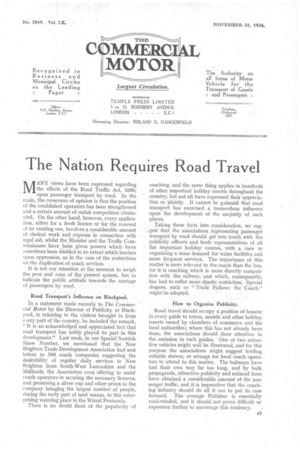The Nation Requires Road Travel
Page 23

If you've noticed an error in this article please click here to report it so we can fix it.
MANY views have been expressed regarding the effects of the Road Traffic Act, 1930, upon passenger transport by road. In the main, the consensus of opinion is that the position of the established operators has been strengthened and a certain amount of unfair competition eliminated. On the other hand, however, every application, either for a fresh licence or for the renewal of an existing one, involves a considerable amount of clerical work and expense in connection with legal aid, whilst the Minister and the Traffic Commissioners have been given powers whith have sometimes been wielded to an extent which borders upon oppression, as in the case of the restrictions' on the duplication of coach services.
It is not our intention at the moment to weigh the pros and cons of the present system, but to indicate the public attitude towards the carriage of passengers, by road. • Road Transport's Influence on Blackpool.
In a statement Made recently to The Commercial Motor by the Directorof Publicity at Blackpool, in referring to the visitors brought in from every part of the country, he included the remark, "It is an acknowledged and appreciated fact that road transport has nobly played its part in this development." Last week, in our Special Scottish Show Number, we mentioned that the New Brighton Trade Development Association had sent letters to 500 coach companies suggesting the desirability of regular daily services to New Brighton from South-West Lancashire and the Midlands, the Association even offering to assist coach operators in securing the necessary licences, and promising a silver cup and other prizes to the company bringing the largest number of people, during the early part of next season, to this enterprising watering place in the Wirral Peninsula.
There is no doubt there of the popularity of coaching. and the same thing applies to hundreds of other important holiday resorts throughout the country, but not all have expressed their appreciation so plainly. It cannot be gainsaid that road transport has exercised a tremendous influence upon the development of the majority of such places.
• Taking these facts into consideration, we suggest that the associations representing passenger transport by road should get into touch with the publicity officers and trade representatives of all the important holiday centres, with a view to organizing a mass demand for wider facilities and more frequent services. The importance of this matter is more relevant to the coach than the bus, for it is coaching which is more directly competitive with the 'railway, and which, consequently, has had to suffer more drastic restriction. Special slogans, such as " Trade Follows the' Coach," might be adopted.
How to Organize Publicity.
Road travel should occupy a position of honour in every guide to towns, seaside and other holiday resorts issued by chambers of commerce and the local authorities ; where this has not already been done, the associations should draw attention to the omission in such guides. One or two attractive vehicles might well be illustrated, and for this purpose the associations might suggest lending suitable stereos, or arrange for local coach operators to attend to this matter. The 'railway' s have had their own way far too long, arid by bulk propaganda, attractive publicity and reduced fares have obtained a considerable amount of the passenger traffic, and it is imperative that the coaching industry should do all it can to put its case forward. The average Britisher is essentially road-minded, and it should not prove difficult or expensive further to encourage this tendency.




























































































